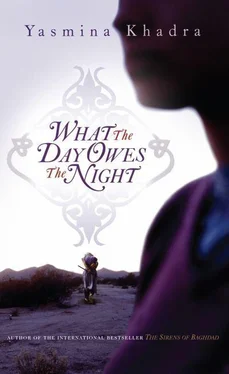I went out and wandered the deserted streets. Then I headed out past the Jewish cemetery to see the charred ruins of the house where, in a fleeting moment, I had had my first sexual experience. A horse stood grazing next to the old stables, indifferent to the shifting fortunes of men. I sat on a low wall; sat there until noon, trying to picture Madame Cazenave. All I could see was Simon’s car in flames, and Émilie, half naked, clutching her child.
The cars came back from Aïn Trémouchent. They had left Río Salado that morning in a fanfare of horns, waving the tricolour; they returned like a funeral cortège, their flags at half-mast. A pall fell over the village. Every face bore the signs of mourning for a hope long since doomed, a dream they had tried to keep alive with prayers and incense. Algeria was to be Algerian.
The following morning, on the front of one of the winemaker’s cellars, someone had had daubed in red paint the letters FLN.
In the spring of 1962, Oran held its breath. I was looking for Émilie. I feared for her. I needed her. I loved her and had come back to tell her so. I felt ready to brave hurricanes and thunderbolts, to flout every sacrilege, every blasphemy. I could not bear to go on longing for her, reaching out to touch her only to feel her absence in my fingertips. I told myself, she will turn you away, she will say terrible things, she will bring your world crashing down around you, but still I went. I was no longer afraid of breaking the oath I had made, of crushing my soul in my fist; I was no longer afraid of offending the gods, of living in infamy to the end of my days. At the bookshop, someone told me that Émilie had left work as usual one night and that they had not heard a word from her since. I remembered the number of the tram she had taken the last time I had come here. At every stop I got off and scoured the nearby streets. I thought I recognised her in every woman I passed on the street, in every shadow disappearing round a corner or into a doorway. I asked for her in grocers’ shops and police stations; I asked the postmen and although I came back empty-handed every night, never for a moment did I feel I was wasting my time. How could I hope to find her in a city under siege, in this midst of the chaos, the fury of men? Algerian Algeria was being delivered by forceps in a torrent of tears and blood as French Algeria lay bleeding to death. And even after seven years of war and horror, though both were on the brink of exhaustion, they still found the strength to go on slaughtering one other.
The week in January 1960 in which pieds-noirs erected barricades and seized government buildings in Algiers had done nothing to stop the inexorable march of history. The putsch in April 1961, a failed coup d’état instigated by a quartet of generals intent on forming a breakaway republic, served only to propel the people into even greater torment. The military were overtaken by events; they fired indiscriminately on civilians, fighting off one community only to be attacked by another. Those who felt they had been sold out by the machinations in Paris – that is, those who supported a complete break from the mother country – took up arms and vowed to reclaim the Algeria being taken from them piece by piece. Towns and villages where plunged into a horrifying nightmare. There were attacks and counterattacks, executions and reprisals, kidnappings and military raids. A European seen fraternising with a Muslim or any Muslim seen with a European risked his life. Demarcation lines divided towns and villages into isolated communities who banded together, anxiously policed their borders and did not hesitate to lynch an unwary passer-by who got the wrong address. Every morning there were broken bodies in the street; every night ghosts fought pitched battles. The graffiti on the walls was like epitaphs – amid the scrawls that read ‘Vote Yes’, ‘FLN’ and ‘Long Live French Algeria’, suddenly the three letters that signalled the apocalypse began to appear: OAS. The Organisation Armée Secrète, born of the anguish of the colonists, of their refusal to face facts, was determined to go on digging its own grave until it reached the pit of hell.
Émilie had disappeared, but I was prepared to bring her back from the underworld itself. I sensed that she was close by, almost within reach; I truly believed that I had only to pull back a screen, open a door, push past a bystander and I would find her. It was as if I were mad. I didn’t notice the pools of blood on the pavements, the pockmarks left by bullets on the walls. I was indifferent to the suspicion of others: their hostility, their contempt, their insults went over my head and never for a moment slowed my search. I could think only of her; had eyes only for her; Émilie was the destiny I had chosen and I cared nothing about anything else.
Fabrice Scamaroni came upon me stumbling around this city that reeked of hate and death. He stopped his car, shouted for me to get in, then drove off at top speed. ‘Are you insane?’ he said. ‘You could get your throat cut round here.’ ‘I’m looking for Émilie.’ ‘And how exactly do you plan to find her when you don’t even know what sort of shithole you’re in – I swear this area is worse than a minefield.’
Fabrice had no idea where Émilie was. She had never come to see him at the newspaper. He had run into her once in Choupot, but that had been months ago. He promised he would see what he could find out.
In Choupot I was directed to a building on the Boulevard Laurent-Guerrero. The concierge informed me that the lady in question had indeed been staying in an apartment on the second floor, but had moved out after an attack in the neighbourhood.
‘Did she leave a forwarding address?’
‘No . . . But if I remember rightly, I think she told the movers to take her to Saint-Hubert.’
I knocked on every door in Saint-Hubert without success. The city was in chaos. The ceasefire declared on 19 March 1962 had sparked off the last pockets of resistance. Knives were pitted against machine guns, grenades against bombs, bystanders were killed by stray bullets. And as I advanced through the horror and the stench of death, Émilie seemed to move farther away. Had she been killed in a bomb blast, by a stray bullet; had she been stabbed and left to bleed to death in a deserted stairwell? Oran spared no one: not the young or the old, not women or the simple-minded who stumbled through these horrors. I was in Tahtaha when two car bombs went off leaving a hundred dead and dozens of the Muslim population of Medina J’dida injured; I was at Petit Lac when the bodies of a dozen Europeans were fished from the polluted waters; I was at the city prison when an OAS unit stormed the building, dragged FLN prisoners into the street and executed them as crowds of people watched; I was on the seafront when saboteurs blew up the fuel depots on the port, cloaking the area in clouds of thick, oily smoke for days. Émilie heard the same explosions I did, I told myself, witnessed the same havoc, suffered the same terrors. I could not understand why our paths had not crossed, why chance, why fate, why providence did not bring us together in this seething mass of evil. I was furious as the days slipped away and brought me no closer to finding her; furious as I stumbled through firing squads, no-go areas, scenes of slaughter and carnage, finding no trace nor even the illusion of a trace that might lead me to her; furious to think she was still in this world as panic gripped every European in the country. A parcel in their letter box could send a family into paroxysms of fear. This was the season of ‘the suitcase or the coffin’. The first waves of emigration were anarchy. Cars laden with suitcases and sobbing people besieged the ports and the airports, while others headed for Morocco. Latecomers sold everything they possessed – shops, houses, cars, factories, concessions – for next to nothing; some did not wait to find buyers. They barely had time to pack their cases.
Читать дальше












